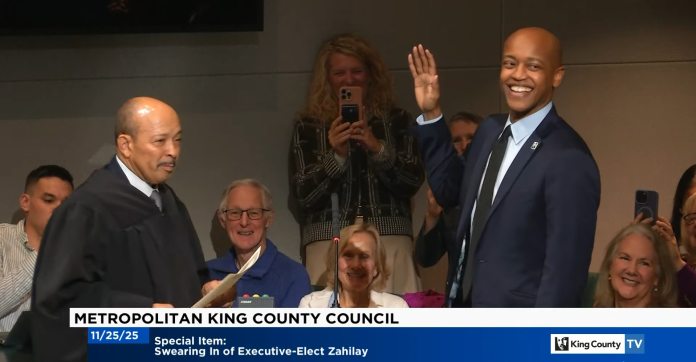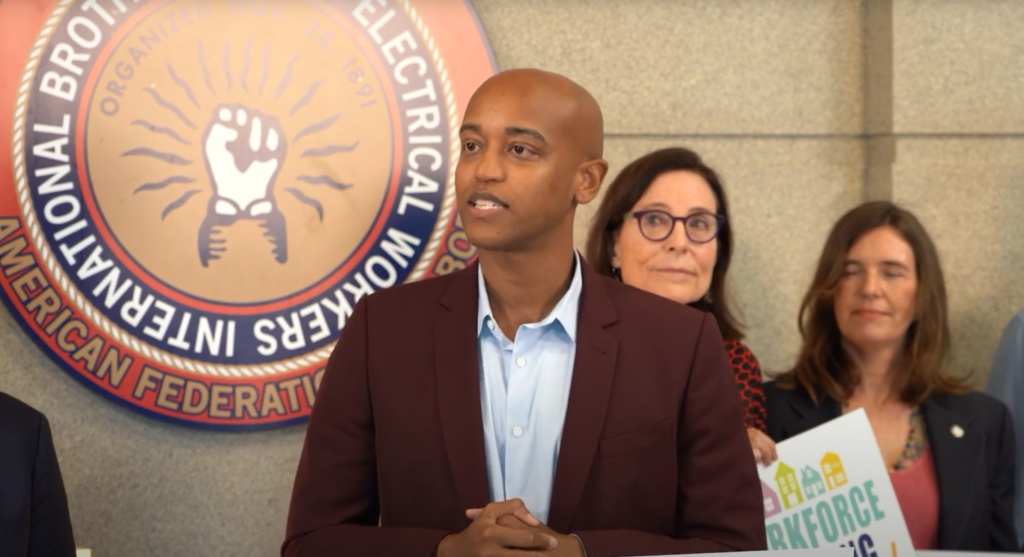
King County entered a new era Tuesday, as Girmay Zahilay was sworn in as the tenth Executive ever to lead Washington’s largest county government. As the first immigrant and the first millennial to hold the office, Zahilay’s election has been seen as a moment of generational change at a level of local government that often sits in Seattle’s shadow.
Zahilay becomes the first new Executive elected to lead King County’s 18,000-employee county government since 2009, when Dow Constantine was first sworn in — ahead of what would be nearly four full terms in the role. After winning his bid to be Sound Transit’s next CEO this past spring, Constantine handed the reins over to his Deputy Executive, Shannon Braddock.
Since Braddock was an unelected appointee, Zahilay took office as soon as election results were certified on Tuesday, five weeks earlier than otherwise.
In the recent election, Zahilay faced Claudia Balducci, one of his colleagues on the King County Council. The race was mellow in spite of its high profile. Zahilay’s focus stayed on bigger picture ideas and his own personal story, in contrast with Balducci’s focus on her own track record being in the weeds on policy. In the end, Zahilay walked away with just over 54% of the vote, after securing a number of major endorsements, including from Governor Bob Ferguson, Representative Pramila Jayapal, and the MLK County Labor Council.
“The oath of office, to me, is a commitment to serve with integrity, to follow the law, to listen before I lead, to center those most affected by our decisions and to focus relentlessly on building a stronger, safer, more affordable and more hopeful King County,” Zahilay said before being sworn in by US District Court Judge Richard Jones. “I’m so humbled by this responsibility. I’m energized by what’s possible.”
Emphasizing what he has been referring to as the four B’s that make up his top priorities — breaking cycles of addiction and homelessness, building infrastructure, creating a better, more accountable government, and getting boots on the ground within communities — Zahilay pledged to bring people together to solve the county’s problems.

“In addition to considering myself the CEO of King County government, I commit to you that I will be a regional convener,” Zahilay said. “Government, community, labor, business, nonprofits, philanthropy, faith leaders, neighborhood organizations, families. We are a region deep with talent. This is such a special place that we live in — if we align those strengths, I believe there is no challenge that we cannot take on.”
In setting up a 100-person transition team, Zahilay has made overtures to corners of the county that might be surprising to the progressives who elected him, including the appointment of Microsoft’s Brad Smith as one of the team’s co-chairs. Smith has become one of the state’s biggest advocates against progressive tax reform, opposing a wealth tax proposal considered by the Washington State Senate earlier this year.
As Executive, Zahilay will face considerable constraints when it comes to the county’s budget, which is significantly hemmed in by a 1% cap on its annual property tax levy, a cap that the legislature has kept in place despite considerable lobbying by city and county officials from around the state. Due to state law, the county mostly cannot approve new revenue options that local cities like Seattle have been pursuing to keep up with rampant inflation and rising demand for services. Seattle added a payroll expense tax in 2020, and is flirting with a local supplement to the statewide capital gains tax.
Those constraints were brought into sharp relief last week, at Zahilay’s final budget vote as a member of the council. The county council unanimously voted to offer a six-month funding reprieve for Harbor Island Studios, the publicly owned film studio that the county has been operating out of a former flour mill since 2021. However, Zahilay laid down a marker before taking office as Executive: he won’t be using the county’s general fund — its most flexible funding source — to pay for its continued operation.
“When it comes to the budget, we’re weighing opportunity costs, trade-offs, risk, and when we use the general fund, which is incredibly volatile and constrained — and it’s also the funding source for so many of our most essential services — the question we have to grapple with is, if we spend money here, what are we not funding? It’s not how important is this thing,” Zahilay said. “As we keep saying, the general fund is not a sustainable or appropriate option here. And for several years, we’ve just basically been kicking the can down the road. […] I won’t be transmitting a budget to the council with general fund dollars for the studio.”
Proponents of a long-term studio funding solution pointed to the benefits that the facility offers to the local economy and its creative industries.

So far the transition team has been acting quickly to transform the Executive’s office, notifying dozens of staff members who likely didn’t consider themselves political appointees that their jobs won’t be carrying forward into the new administration. Those workers include much of the existing staff in the Executive Climate Office (ECO) as well as long-range planners who manage the county’s growth planning. As reported by PubliCola, the restructure is poised to impact around 100 of the 133 people currently serving in the Executive’s office’s appointed positions.
Tuesday’s swearing-in means there’s now a vacancy on the King County Council. Later this month, the county council will be tasked with appointing a new representative for District 2, which spans from Skyway all the way into Seattle’s Ravenna neighborhood and had been represented by Zahilay since 2020. Earlier this week, Zahilay announced that he would be submitting a list of three names for the council to consider in appointing his old seat, under the expectation that none of those candidates would file to run for the seat next November.
That process is a departure from the precedent set in 2009, when the council filled a vacancy left by the election of Dow Constantine (who had represented District 8) by picking from a list of names produced by an independent community advisory committee, cutting Constantine out of the process. In the end, the council interviewed four different candidates, some who had intended to run (including Joe McDermott, who would later go on to win the seat) and those who didn’t, ultimately selecting former Seattle Councilmember Jan Drago.
Zahilay being directly involved in selecting the candidates to fill his own former seat could open up his office to charges of political favoritism and a potential quid pro quo.
Taking over Zahilay’s role as Chair of the King County Council will be District 3’s Sarah Perry, who represents a large swath of Northeast King County, including Woodinville, Issaquah, and North Bend. Jorge L. Barón (who represents Northwest Seattle’s District 4) will take Perry’s place as Vice Chair.
Balducci will continue to serve on the county council, but the committee shakeup includes ousting her as Chair of the Committee of the Whole, leaving her leading only the Regional Water Quality Committee — likely to be one of the sleepier committees.
Author’s note: The Urbanist Elections Committee (on which I serve) endorsed Claudia Balducci for County Executive, while also noting Zahilay made a credible case as an urbanist.
Ryan Packer has been writing for The Urbanist since 2015, and currently reports full-time as Contributing Editor. Their beats are transportation, land use, public space, traffic safety, and obscure community meetings. Packer has also reported for other regional outlets including BikePortland, Seattle Met, and PubliCola. They live in the Capitol Hill neighborhood of Seattle.


